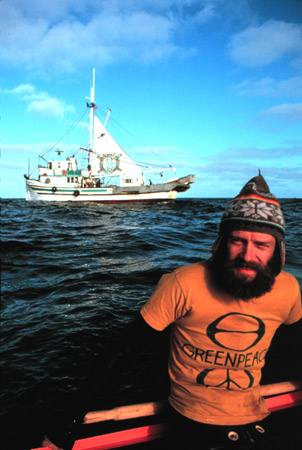Bob Hunter, profile of a visionary
(Version anglaise seulement)

Little indicated in Robert Hunter’s upbringing that he would grow to become one of Canada’s- and eventually the world’s- leading environmentalist campaigners. Born in 1941 near Winnipeg (Canada), Hunter, known to all as Bob, was a rebellious child who rather disliked school, apart from English and Art class. Leading a hippy lifestyle, he travelled extensively before settling down as a journalist, first at the Winnipeg Tribune, and then at the Vancouver Sun. Early on, environmental issues started to become prominent in his articles.
In his column at the Vancouver Sun, one of the Canada’s first to deal with ecology and environmental issues, Hunter began to warn of the adverse effects of the nuclear testing in Amchitka. His article did not go unnoticed: over 7000 people went out on the streets of Vancouver in protest. This was the beginning of something considerably bigger. Hunter, along with a group of mostly Canadian activists, boarded a small ship and spent several weeks on the high seas, trying to stop the nuclear detonation at Amchitka. During this momentous protest, Hunter played a key role in dealing with the media, at the same time setting the tone for Greanpeace’s brand of activism.
As Greenpeace moved to become an international organization in 1973, Hunter was named president and led Greenpeace’s transformation into a far-reaching organization with a presence in 41 countries. According to Frank Zelko, leading scholar on Greenpeace: “Hunter had the vision and the guts to take the organization in a new direction. Even though he was hardly suited to the managerial aspects of the task, he helped Greenpeace take its first steps toward professional NGO status. He made plenty of mistakes along the way, but he also got many things right.”

Indeed, Hunter captured a spirit that became part of Greenpeace’s culture. He believed in confronting issues at face value and was able to express Greenpeace’s work in a way that attracted journalists. Because of the key importance of media coverage, Hunter’s role at Greenpeace was of even more significance.
In 1981, Hunter left Greenpeace to return to writing and broadcasting in Toronto, where he also hosted a television show. Yet he never really left Greenpeace. According to Bruce Cox, Executive Director at the Greenpeace office in Montreal, Hunter “was special in that he stayed actively involved until the very end - this shows how much he cared.” Cox remembers how, a few weeks after he was hired at Greenpeace in Montreal, Hunter invited him for a beer: “He wanted to talk to me, to tell me about his experiences. To let me feel what his vision of Greenpeace was. Unfortunately, that meeting never came to be. The following day Hunter was hospitalized, and his health deteriorated from there.”
Hunter, who died of prostate cancer at the age of 63, in early May 2005, is sorely missed among many Greenpeace activists worldwide. During an international Greenpeace conference a few weeks later, activists from all walks of life told stories about Hunter, about his passion and his humour. According to Cox, Hunter was a loved and respected man in the organization, with a youthful passion till the very end. “He inspires me to do, to act. Even when the situation seems uncomfortable, I ask myself: what would Bob have done in my shoes? And I act accordingly. After all, our mission is not to be passive, we need to be strategic and up-front when we can.”
Hunter’s book, Occupied Canada, won a Governor-General’s Award for literature in 1991. This was one of twelve books that Hunter published. Almost a decade later, in 2000, Time magazine named him as one of the 20th century's top 10 environmental heroes. He even had a short stint at politics, where he ran unsuccessfully as a Liberal for the Ontario provincial legislature.
Hunter’s old friend and another co-founder of Greenpeace, Paul Watson, regarded Hunter as “plainly and simply one of the most inspiring and visionary environmentalists of our time.” For him, without Hunter, “there would not today be a Greenpeace organization. It would simply be a footnote in the history books from the early seventies.”
See also: Greenpeace’s activism : Too radical or too peaceful ?
 To learn more
To learn more
Hunter, Robert,
Greenpeace, Toronto: McClelland and Stewart, 1972.
Hunter, Robert,
Warriors of the Rainbow: a chronicle of the Greenpeace movement, New York: Holt, Rinehart and Winston, 1979.
Weyler, Rex,
Greenpeace: The Inside Story: How a Group of Ecologists, Journalists and Visionaries Changed the World, Vancouver : Raincoast Books, 2004.
* Greenpeace_Weyler.